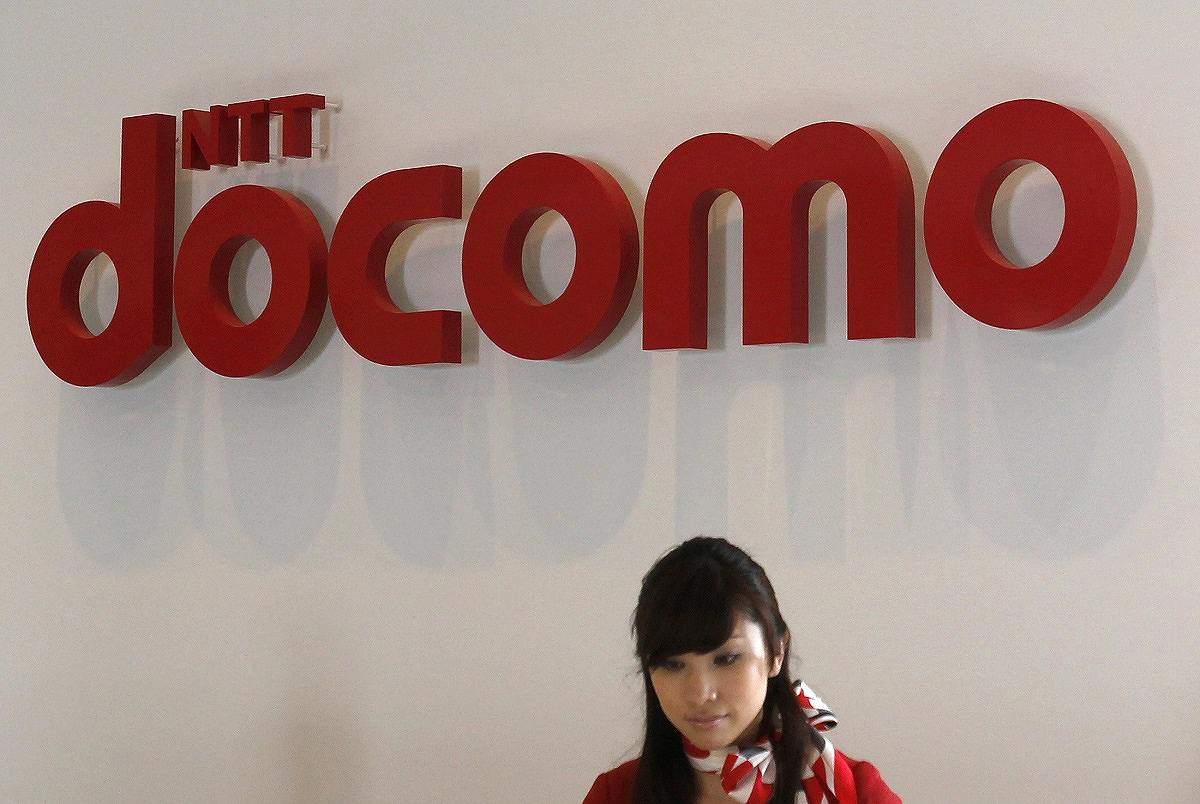
A receptionist works in front of a logo of NTT DoCoMo, Japan’s biggest mobile operator, at its headquarters in Tokyo July 8, 2011.
14:08 JST, February 8, 2021
Major mobile phone carriers stepping up drastic rate cuts is a welcome move, but it is not good if budget brands find themselves in a quagmire as a result. It is hoped that the government will create an environment for fair competition so that users will not be limited in their choices.
In response to the government’s request for rate reductions, NTT Docomo Inc. and SoftBank Corp. will roll out 20-gigabyte smartphone plans for ¥2,980 per month excluding tax.
Now that “au” mobile phone service operator KDDI Corp. has also announced a plan in which it will charge users the same price as the other two companies’ new plans — if a free phone call service of up to five minutes per call is included — new rates from the three major carriers are set.
The new rates will be less than half of the ¥7,000 level that the three companies currently offer. They said signing the subscription contracts can only be done online.
Price cuts are good news in regard to household budgets, but budget brands lament the recent moves by the major carriers as budget brands were expected to play a role in encouraging price competition in the industry.
Large companies from other industries, such as the electric power sector, and many new small independent companies have entered the budget mobile phone business. They do not have their own networks, so they lease them from the major operators to run their services.
The new prices set by the major carriers are lower than some of those offered by the budget brands. Some have stepped up cutting their rates out of a sense of urgency, but newcomers to the industry are not strong enough to withstand a war of attrition.
If companies in good shape are also weeded out, the oligopoly of the three major companies could possibly intensify again as a result.
The three major carriers previously accounted for nearly 90% of total market share. Concluding that such a situation caused mobile phone rates to remain high, the Internal Affairs and Communications Ministry adopted a strategy of fostering budget brands to promote competition and realize lower prices.
At the same time, the Cabinet of Prime Minister Yoshihide Suga put strong pressure on the major carriers, and that led to immediate rate reductions. But it also weighed on the operations of the budget brands. If the current situation continues, the government may not be able to maintain consistent policies.
The government must come up with concrete measures as soon as possible so that all the companies in the industry, including new entrants, can compete fairly.
The ministry has set a goal of having the major service providers lower network lease charges, which place a heavy burden on budget brands, by about 50% by fiscal 2022. An industry group of budget brands is calling for lowering the charges ahead of schedule and a further reduction.
Appropriate prices should be scrutinized, and reductions should be realized promptly.
It is also essential to make it easier for users to change carriers. The ministry is considering streamlining procedures for the mobile phone number portability system in which users can retain the same phone number after changing service providers. It is important to establish a framework to reduce the administrative burden on users.
Top Articles in Editorial & Columns
-

Riku-Ryu Pair Wins Gold Medal: Their Strong Bond Leads to Major Comeback Victory
-

Reciprocal Tariffs Ruled Illegal: Judiciary Would Not Tolerate President’s High-Handed Approach
-

China Provoked Takaichi into Risky Move of Dissolving House of Representatives, But It’s a Gamble She Just Might Win
-

Japan’s Plan for Investment in U.S.: Aim for Mutual Development by Ensuring Profitability
-

Flu Cases Surging Again: Infection Can Also Be Prevented by Humidifying Indoor Spaces
JN ACCESS RANKING
-

Producer Behind Pop Group XG Arrested for Cocaine Possession
-

Japan PM Takaichi’s Cabinet Resigns en Masse
-

Man Infected with Measles Reportedly Dined at Restaurant in Tokyo Station
-

Israeli Ambassador to Japan Speaks about Japan’s Role in the Reconstruction of Gaza
-

Videos Plagiarized, Reposted with False Subtitles Claiming ‘Ryukyu Belongs to China’; Anti-China False Information Also Posted in Japan























